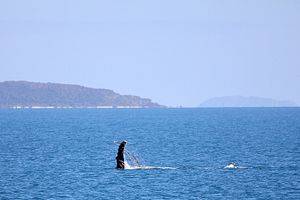Earlier this week Japan resumed its commercial whaling operations for the first time in 31 years. The move comes after the country officially withdrew itself from the International Convention for the Regulation of Whaling and its intergovernmental organization, the International Whaling Commission (IWC), in December last year. Japanese whaling operations began one day after the six-month notice period.
The decision has the potential to reignite Japan’s previous disputes over whaling with staunchly anti-whaling Australia. Japan’s resumption of whaling comes amid a shifting geopolitical landscape in the Indo-Pacific, where both countries should instead be finding ways to reinforce their partnership.
Japan is fiercely protective of its right to whale, and the country has continually found itself at odds with most of the international community over the issue. Japan has viewed the international moratorium on whaling as a threat to its resource security, as well as an issue that does not respect interstate differences in culture and cuisine. In a symbolic move, whaling vessels left from the traditional whaling hub of Shimonoseki Monday morning. The port city forms part of Prime Minister Shinzo Abe’s electoral constituency. While this move may have been an exhibition of cultural pride, it is questionable whether the current demand for whale meat warrants the re-establishment of commercial whaling operations.
In response to Japan’s resumption of whaling operations, Australia’s Foreign Minister Marise Payne released a statement urging Japan to return to recognition of the international whaling convention, and to participation in the IWC, as a matter of priority. Payne reiterated that the Australian government’s position on whaling is unchanged, and that Canberra remains opposed to all forms of commercial whaling, including whaling masquerading as scientific research. The latter had in the past become an area of serious contention between the two countries.
While Payne’s statement made it clear that Australia will retain its position to “uphold the global moratorium on commercial whaling and promote whale conservation,” she also made note of one area of dispute between Canberra and Tokyo that may be eased by Japan’s actions. Japan’s decision to return to commercial whaling has been premised on restricting its operations to its own territorial waters and exclusive economic zone (EEZ). Due to this restriction Japan is placing upon itself, Payne noted that “the vast Southern Ocean is now a true sanctuary for whales.”
Australia was instrumental in the establishment of the Southern Ocean Whale Sanctuary in 1994 (a similar sanctuary was established in the Indian Ocean in 1979). Areas within the Southern Ocean, particularly around Antarctica, are home to the largest concentration of whales in the world. Japan had previously disregarded the conditions of the sanctuary and used the region to conduct what it claimed was scientific research on the mammals. Australia has often sent ships and surveillance aircraft into the Southern Ocean to monitor Japanese activity. Although Australia maintains a large search and rescue zone (SAR) in the Southern Ocean, this zone is considered a responsibility, rather than an area of sovereignty.
However, in 1999 Australia established its own whale sanctuary within all its EEZs, including around its territories of Heard Island and Macquarie Island in the Southern Ocean. This sanctuary also includes — in Australia’s eyes — a significant section of the Southern Ocean adjacent to the Australian Antarctic Territory. Yet, Australia’s claims on Antarctica have never been accepted by Japan, and indeed only France, New Zealand, Norway, and the United Kingdom formally recognize Australia’s claims. To complicate matters further, the 1959 Antarctic Treaty does not make foreigners subject to the laws of countries with Antarctic territorial claims, and the EEZs that are established by these claims. This makes it difficult for Canberra to enforce its will on Japanese vessels.
Despite this, in 2010 Australia initiated proceedings against Japan in the International Court of Justice (ICJ) for breaching the Whaling Convention. Australia alleged that breaches included conducting scientific research that lacked any relevance to the conservative and management of whale populations, hunting fin and humpback whales within the Southern Ocean Sanctuary, and breaching the Convention on International Trade in Endangered Species (CITES).
In 2014 the ICJ ruled that Japan must cease its whaling program in the Southern Ocean, stating that Japan had violated the moratorium on all commercial whaling, the moratorium on the use of factory ships to process whales, and the prohibition of whaling in the Southern Ocean Sanctuary. Japan halted its Southern Ocean operations for a year, but then recommenced them under operations it deemed compliant with the ICJ ruling. Australia did not agree.
While Japan’s decision to only conduct commercial whaling operations within its northern Pacific waters removes this area of tension between Tokyo and Canberra, Payne’s statement makes it clear that Australia will not be placated by this decision. Payne reiterated that the Australian “government is unwavering in its commitment to protect whales. Australia will continue to oppose any efforts to overturn the global moratorium on commercial whaling, and will call on like-minded nations to join us in rejecting any proposal to allow commercial whaling.’’
Despite the firm positions that both countries hold on the issue, they have also proved adept at isolating this area of disagreement from the wider bilateral relationship. As both countries remain wary of changing dynamics in the region, and cognizant of their wider agreements, maintaining this approach to the dispute should be deemed a priority to both countries’ leaderships.

































